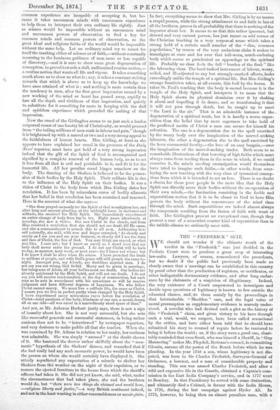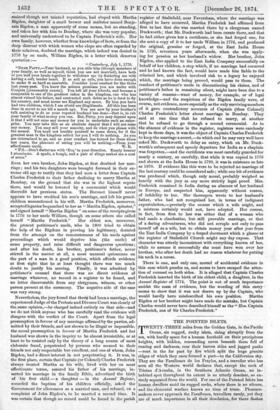THE " FREDERICK " SUIT.
WE should not wonder if the ultimate result of the verdict in the " Frederick " case just decided in the Probate Court were to produce a great crop of interesting law-suits. Lawyers, of course, remembered the precedents, but we doubt if the public had previously been made so clearly aware that a "marriage can be established in this country by proof other than the production of registers, or certificates, or other indisputable documentary evidence, and after long endur- ance by the claimants of a suspicion of illegitimacy. Indeed, the very existence of a Court empowered to investigate and decide upon questions of legitimacy is known to few outside the educated classes, and, to them mainly by the proceedings in that interminable " Shedden " case, and the legal value of moral presumption as supplementary evidence is scarcely under- stood. A novelist who had devised such a plot as the history of this " Frederick " claim, and given victory to his hero through such a trial, would, we suspect, have been called sensational by the critics, and have either been told that he should have submitted his story to counsel of repute before he ventured to bring it before the world ; or, if the story were a good one, chari- tably reminded that even Scott, who was himself a ,Sheriff, in "Guy Marmering" makes Mr. Pleydell, Bertram's counsel, in committing Glossin, assume all the power of the Bench before which ho was pleading. In the year 1748 a son, whose legitimacy is not dis- puted, was born to Sir Charles Frederick, Surveyor-General of Ordnance, a baronet, and a man of considerable property and standing. This son was named Charles Frederick, and after a wild and expensive life in the Guards, obtained a Captain's com- mission in the East India Company's service, and in 1777 went to Bombay. In that Presidency he served with some distinction, and ultimately died a Colonel, in favour with the India House, in 1791, during the last campaign against Hyder AIL In 1773, however, he being then an almost penniless man, with a
stained though not tainted reputation, had eloped with Martha Rigden, daughter of a small brewer and maltster named Benja- min Rigden, a man apparently of some means, but no standing, and taken her with him to Bombay, where she was very popular, and universally understood to be Captain Frederick's wife. Her own family, however, whether from knowledge of facts, or from the deep distrust with which women who elope are often regarded by their relatives, doubted the marriage, which indeed was denied in 1776 by an uncle, William Rigden, in a letter which deserves quotation :— " Canterbury, July 1,1776.
"Dssa PArry,—Your husband, as you stile him (though members of your family, as well as myself, think you are not married), have both
of you laid your heads together to withdraw me by flattering me with having a soft, tender heart. If as soft as oyle, you have done enough to make it as hard as marrable. Consider your conduct for the three last years past. You know the solemn promises you are under with Cosquin [presumably cousin]. You left all your friends, and became a companion to one of the greatest rakes in the kingdom, one who has almost ruined his father, and contracted such debts as he is forst to fly
his country, and must never see England any more. By him you have had two children, which I am afraid are illegitimate. All this has been
dono in secret to me till a mpnth ago. You are now by your brother's talk assisting to do as your reputed husband has done—that is, to rob your family of what money you can. But, Patty, you may depend upon it that I will not raise any money for you to undertake such an enter-
prise. You may take this as an absolute denyal that I will not raise any money. You may sell your annuity, and do what you please with the money. You need not trouble yourself to come down, for if the greatest man in the kingdom solicit for you I will do nothing. As you are determined to go, and as your conduct has turned for these three last years, the pleasure of seeing you will be nothing.—From your affectionate uncle, W. R. "P.S.—Don't flatter me with 'Esq.' in your direction. Empty honour I abominate. A spade, a bough, and a pair of slings makes me a coat of arms."
Even her own brother, John Rigden, at first doubted her mar- riage ; and his two daughters were brought forward in their ex- treme old age to testify that they had seen a letter from Captain Charles Frederick to their father declining to marry Martha at Bombay, on the ground that she was in the highest repute there, and would be lowered by a ceremonial which would discredit her previous status. The Baronet himself never appears to have credited his son's marriage, and left his grand- children unmentioned in his will. Martha Frederick., moreover, accepted legacies bequeathed to her as " Martha Rigden, spinster," and signed herself " Martha Rigden " on some of the receipts given in 1776 to her uncle William, though on some others she called herself " Martha Frederick." Her eldest son, moreover, the present petitioner's uncle, who in 1800 tried to obtain the help of the Rigdens in proving his legitimacy, desisted from the attempt on the remonstrances of his uncle against proceedings which would deprive him (the uncle) of some property, and raise difficult and dangerous questions ; and after his death, his brother, petitioner's father, never stirred in the matter at all, a moat unusual quiescence on the part of a man in a good position, which affords evidence at first sight that he at least thought there was too much doubt to justify his moving. Finally, it was admitted by petitioner's counsel that there was no direct evidence of marriage whatever, no record in a register to be found, and no letter discoverable from any clergyman, witness, or other person present at the ceremony. The negative side of the case was very strong.
Nevertheless, the jury found that there had been a marriage, the experienced Judge of the Probate and Divorce Court was clearly of the,same opinion,—he charged indeed entirely on that side—and we do not think anyone who has carefully read the evidence will disagree with the verdict of the Court. Apart from the legal presumption in favour of any marriage affirmed by the parties, ad- mitted by their friends, and not shown to be illegal or impossible, the moral presumption in favour of Martha Frederick and her husband was shown in the inquiry to be almost irresistible, or at least to be resisted only by the theory of a long course of most elaborate fraud, perpetrated by persona who seemed to their friends not only respectable but excellent, and one of whom, John Rigden, had a direct interest in not perpetrating it. It was, in the first place, certain that Captain (or Colonel) Charles Frederick always treated Martha as his wife, lived with her on most affectionate terms, assured his father of his marriage, in- serted his marriage in the family Bible, advertised the birth of his first child — a daughter — in the Annual Registir, recorded the baptism of his children officially, asked the Government for allowances as a married man, and refused, on a complaint of John Rigden's, to be married a second time. It was certain that though no record could be found in the parish register- of Stalisfield, near Faversham, where the marriage was alleged to have occurred, Martha Frederick had affirmed from first to last that she was married there by a clergyman named Duckworth; that Mr. Duckworth had been curate there, and that he had either given her a certificate, or she had forged one, for she sent a copy of it to her uncle William in 1776, and produced the original, genuine or forged, at the East India House in 1793, seventeen years afterwards, when she was apply- ing for pension as her husband's widow. Her brother, John Rigden, also applied to the East India Company successfully on behalf of her children, a step which, if no marriage had occurred and he had known the fact, would have made him liable to the criminal law, and which involved risk to a legacy be enjoyed which, the marriage being proved, would pass to them. The conduct of petitioner's uncle in discontinuing his claims, and of petitioner's father in remaining silent, might have been due to a variety of reasons—want of money, for example, or of legal knowledge—and the suspicions of the Rigden family were, of course, not evidence, more especially as the only surviving members of it gave contradictory accounts of Captain (then Colonel) Charles Frederick's letter about marriage in Bombay. They said at one time that he refused to marry, at another that he refused to go through a second ceremonial. As to the absence of evidence in the register, registers were carelessly kept in those days, it was the object of Captain Charles Frederick to keep the marriage a secret,—to which end he may very well have asked" Mr. Duckworth to delay an entry, which on Mr. Duck- worth's subsequent and speedy departure for India as a chaplain was forgotten,—and the certificate was most carefully guarded for nearly a century, so carefully, that while it was copied in 1776 and shown at the India House in 1793, it was in existence so late as 1870. If evidence like this were to be rejected no marriage of the last century could be considered safe ; while one bit of evidence was produced which, though only moral, probably weighed as heaVily with the jury as any more strictly legal proof. Mrs. Frederick remained in India during an absence of her husband in Europe, and suspected him, apparently without reason, of infidelity to her. She- thereupon wrote to her husband's father, who had not recognised her, in terms of indignant expostulation,—precisely the course which a wife might, and a mistress certainly would not, have adopted. Her course, in fact, from first to last was either that of a woman who had made a clandestine, but still provable marriage, or that of a daring adventuress, who did not scruple not only to pass herself off as a wife, but to obtain money year after year from the East India Company by a forged document which a glance- at the register of Stalisfield Church might any day expose. That character was utterly inconsistent with everything known of her, while to assume it successfully she must have won over her brother, who after her death had no reason whatever for putting his neck in a noose.
There is one, and only one, morsel of accidental evidence in this case which puzzles us, and seems to have escaped the atten- tion of counsel on both sides. It is alleged that Captain Charles Frederick inserted the birth of his eldest child, a daughter, in the Annual Register of 1774. The point is not of much importance amidst the mass of evidence, but the wording of this entry seems to show that it was not drawn up by the Captain, who would hardly have mis. described his own position. Martha Rigden or her brother might have made the mistake, but Captain Charles would never have described himself as the " Hon. Captain Frederick, son of Sir Charles Frederick."



































 Previous page
Previous page